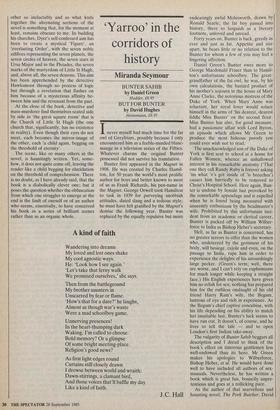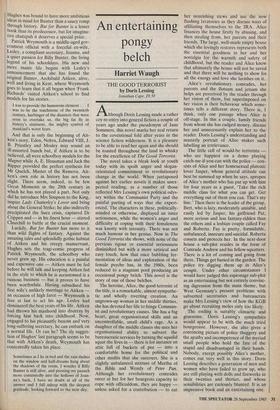‘Yarroo' in the corridors of history
Miranda Seymour
BUNTER SAHIB by Daniel Green
Hodder, f8.95
BUT FOR BUNTER by David Hughes Heinemann, f8.95 Inever myself had much time for the fat owl of Greyfriars, possibly because I only encountered him as a feeble-minded blanc- mange in a television series of the Fifties. Whatever charms the original Bunter possessed did not survive his translation.
Bunter first appeared in the Magnet in 1908. He was created by Charles Hamil- ton, for 50 years the world's most prolific author for boys and better known to most of us as Frank Richards, his pen-name in the Magnet. George Orwell took Hamilton to task in 1939 for purveying snobbish attitudes, dated slang and a tedious style; he must have felt gratified by the Magnet's demise the following year. Bunter was replaced by the equally repulsive but more
endearingly awful Molesworth, drawn by Ronald Searle; the fat boy passed into history, there to languish as a literary footnote, unloved and unread.
Forty years on, Bunter is back, greedy as ever and just as fat. Appetite and size apart, he bears little or no relation to the Bunter for whom a few of you may feel a lingering affection.
Daniel Green's Bunter owes more to George Macdonald Fraser than to Hamil- ton's unfortunate schoolboy. The great- grandfather of the fat owl, he was, by his own calculations, the bastard product of his mother's sojourn in the house of Mary Anne Clarke, the notorious mistress of the Duke of York. When Mary Anne was reluctant, her royal lover would solace himself in the arms of 'his dearest, dearest liddle Miss Bunter' on the second floor. Miss Bunter has also, for good measure, had a passionate affair with Lord Byron, an episode which allows Mr Green to produce the most hideous parody you could ever wish not to read.
The unacknowledged son of the Duke of York is first sent to school at a home for Fallen Women, whence an unhallowed interest in his remarkable anatomy (`That one they call Randy Ruby is forever asking 'im what 'e's got inside of 'is breeches') causes him hurriedly to be removed to Christ's Hospital School. Here again, Bun- ter is undone by female lust provoked by the remarkable appendage and is expelled when he is found being measured with unseemly enthusiasm by the headmaster's wife. Prohibited by this unfortunate inci- dent from an academic or clerical career, Bunter is packed off by William Wilber- force to India as Bishop Heber's secretary.
Hell, as far as Bunter is concerned, has no greater terrors to offer than the women who, undeterred by the grossness of his body, will besiege, cajole and even, on the passage to India, rape him in order to experience the delights of his astonishingly large pecker. (Green's term; well, there are worse, and I can't rely on euphemisms for much longer while keeping a straight face.) His English experiences have given him no relish for sex; nothing has prepared him for the ruthless onslaught of his old friend Harry Ram's wife, the Begum, lustrous of eye and rich in experience. As the Begum's chief captive concubine, with his life depending on his ability to match her insatiable lust, Bunter's luck seems to have run out. It doesn't, of course, and he lives to tell the tale — and to open London's first Indian take-away.
The vulgarity of Bunter Sahib beggars all description and I dread to think of the book's effect on timorous gentlemen less well-endowed than its hero. Mr Green makes his apologies to Wilberforce, Bishop Heber, et at. He would have done well to have included all authors of sex- manuals. Nevertheless, he has written a book which is great fun, bouncily unpre- tentious and goes at a rollicking pace.
As the author of that marvellous and haunting novel, The Pork Butcher, David Hughes was bound to have more ambitious ideas in mind for Bunter than a saucy romp through history. But for Bunter is a lesser book than its predecessor, but for imagina- tive chutzpah it deserves a special prize. Patrick Weymouth is a middle-aged gov- ernment official with a forceful ex-wife, Lesley, a compliant secretary, Joanna, and a quiet passion for Billy Bunter, the living legend of his schooldays. His new and more manic life begins with Lesley's announcement that she has found the original Bunter, Archibald Aitken, alive, well and living in Kent, where Weymouth goes to learn that it all began when 'Frank Richards' visited Aitken's school to find models for his stories.
I was to provide the humorous element . . . I was to be the touchstone of the twentieth century, harbinger of the disasters that were soon to overtake us, the big fat fly in history's ointment, the mighty symbol of mankind's worst fears.
And that is only the beginning of Ait- ken's story. Eden, Nehru, Edward VIII, J. B. Priestley and Mosley may sound an 111-assorted bunch but, if Aitken is to be believed, all were schoolboy models for the Magnet while A. E. Housman and Jack the Ripper provided the perfect synthesis for Mr Quelch, Master of the Remove. Ait- ken's own role in history has not been slight. There seem, indeed, to be few Great Moments in the 20th century in which he has not played a part. Not only did he introduce Mrs Simpson to the King, inspire Lady Chatterley's Lover and bring about the General Strike; he also indirectly precipitated the Suez crisis, captured Dr Crippen and — in his finest hour — stirred Churchill to battle at the crucial moment.
Luckily, But for Bunter has more to it than wild flights of fantasy. Against the amazing tales and splendidly gothic habitat of Aitken and his creepy manservant, Hughes sets the tragi-comic progress of Patrick Weymouth, the schoolboy who never grew up. His education is a painful and expensive one — Aitken must be fed before he will talk and keeping Aitken fed in the style to which he is accustomed is a ruinous business — but it proves to have been worthwhile. Having subsidised his first wife's unlikely marriage to Aitken an occasion of high farce — Weymouth is free at last to act his age. Lesley had dominated the best years of his life. Aitken had thrown his manhood into disarray by forcing him back into childhood. Now, engaged to his pleasantly buxom and very long-suffering secretary, he can embark on a normal life. Or can he? The sly sugges- tion of Hughes' last paragraph seems to be that with Aitken's death, Weymouth has contentedly taken his place.
Sometimes as I lie in bed and the rain dashes on the window and half-dreams hang about the shadows of the room, I wonder if Billy Bunter is still alive, and pressing my paunch more contentedly into the hollows of Joan- na's back, I have no doubt at all of the answer and I fall asleep with the deepest gratitude, looking forward to the next day.















































 Previous page
Previous page